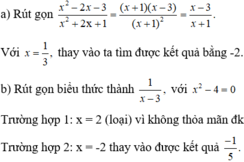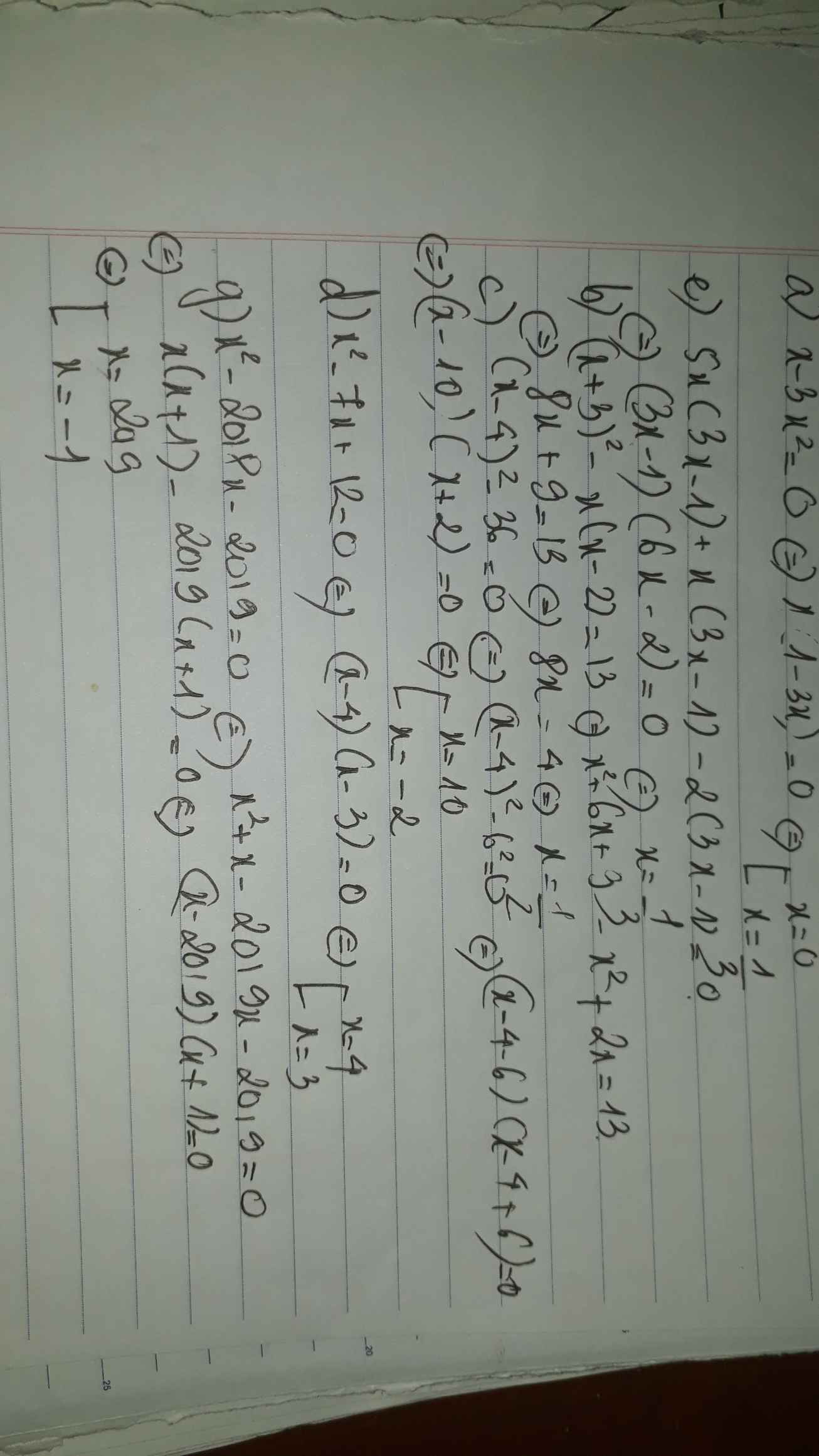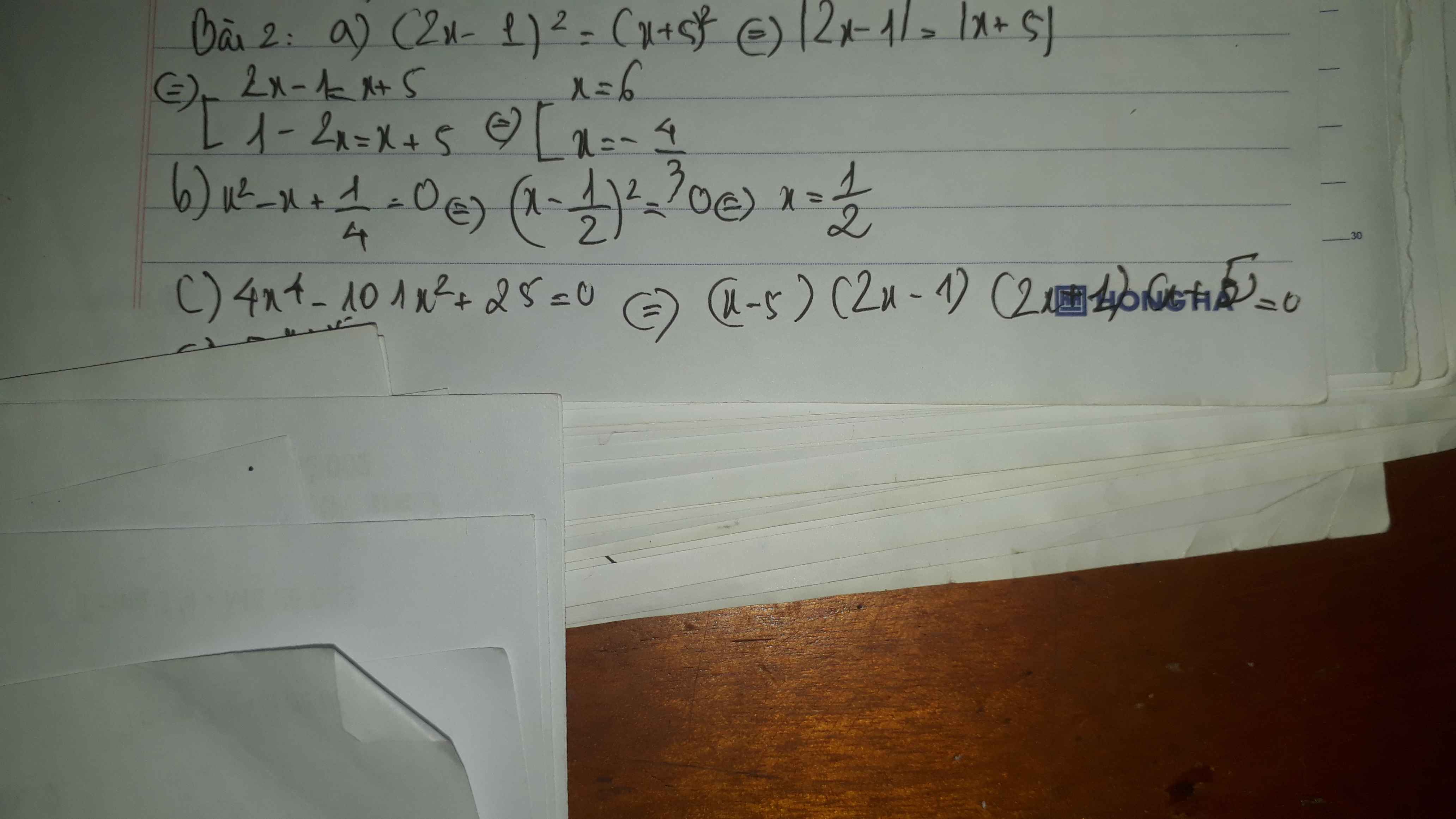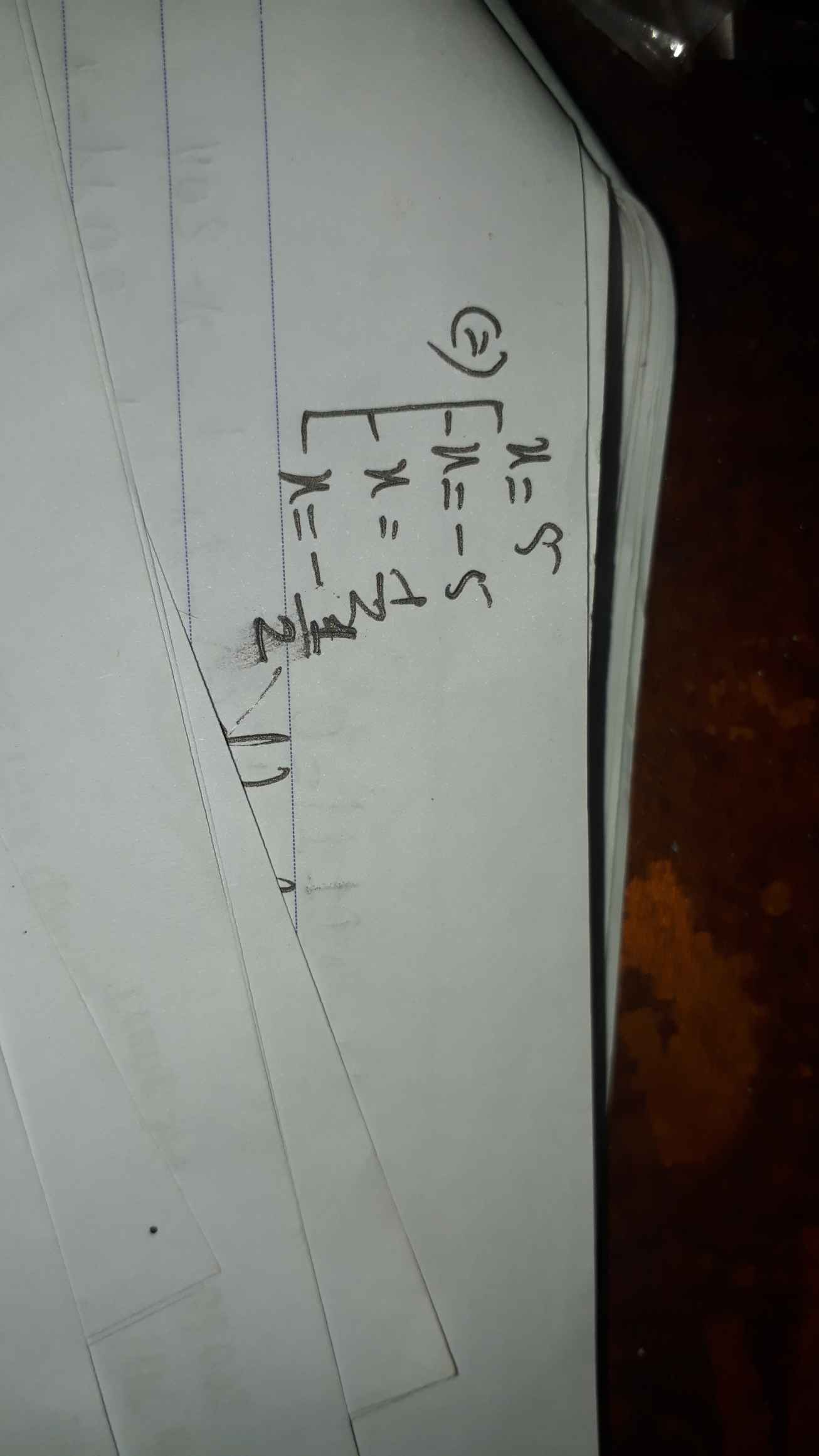Cho A={x∈Z / (x-1) (5x -3x2)(x2 -2x -3)=0}
CT
Những câu hỏi liên quan
Cho A {x ∈ Z | x2 4}; B { x ∈ Z | (5x - 3x2)(x2 - 2x - 3) 0}. Số phần tử của tập hợp (A∪B) (A ∩ B) là: A. 0 B. 3 C. 2 D. 1
Đọc tiếp
Cho A = {x ∈ Z | x2 < 4}; B = { x ∈ Z | (5x - 3x2)(x2 - 2x - 3)= 0}. Số phần tử của tập hợp (A∪B) \ (A ∩ B) là:
A. 0
B. 3
C. 2
D. 1
Đáp án: C
A = {0;-1;1}; B = {0;-1;3}
A ∪ B = {0;-1;1;3}; A ∩ B = {0;-1}
(A ∪ B) \ (A ∩ B) = {1;3} => có 2 phần tử.
Đúng 0
Bình luận (0)
Tính giá trị của phân thức:a)
x
2
−
2
x
−
3
x
2
+
2
x
+
1
với
x
≠
−
1
tại
3
x
−
1...
Đọc tiếp
Tính giá trị của phân thức:
a) x 2 − 2 x − 3 x 2 + 2 x + 1 với x ≠ − 1 tại 3 x − 1 = 0 ;
b) x − 2 x 2 − 5 x + 6 với x ≠ 2 ; x ≠ 3 tại x 2 − 4 = 0 .
Viết mỗi tập hợp sau bằng cách liệt kê các phần tử
a) A= {x ∈ R | (2x – x2)( 3x – 2) = 0}
b, B = { x∈ Z | 2x3-3x2-5x = 0 }
c , C= { x ∈ Z | 2x2 -75x -77 = 0 }
d , D = { x ∈ R | (x2 - x - 2 ) (x2 - 9 ) = 0 } .
`#3107.101107`
a,
\(\text{A = }\left\{x\in R\text{ | }\left(2x-x^2\right)\left(3x-2\right)=0\right\}\)
`<=> (2x - x^2)(3x - 2) = 0`
`<=>`\(\left[{}\begin{matrix}2x-x^2=0\\3x-2=0\end{matrix}\right.\)
`<=>`\(\left[{}\begin{matrix}x\left(2-x\right)=0\\3x=2\end{matrix}\right.\)
`<=>`\(\left[{}\begin{matrix}x=0\\2-x=0\\x=\dfrac{2}{3}\end{matrix}\right.\)
`<=>`\(\left[{}\begin{matrix}x=0\\x=2\\x=\dfrac{2}{3}\end{matrix}\right.\)
Vậy, `A = {0; 2; 2/3}`
b,
\(\text{B = }\left\{x\in R\text{ | }2x^3-3x^2-5x=0\right\}\)
`<=> 2x^3 - 3x^2 - 5x = 0`
`<=> x(2x^2 - 3x - 5) = 0`
`<=>`\(\left[{}\begin{matrix}x=0\\2x^2-3x-5=0\end{matrix}\right.\)
`<=>`\(\left[{}\begin{matrix}x=0\\2x^2-2x+5x-5=0\end{matrix}\right.\)
`<=>`\(\left[{}\begin{matrix}x=0\\\left(2x^2-2x\right)+\left(5x-5\right)=0\end{matrix}\right.\)
`<=>`\(\left[{}\begin{matrix}x=0\\2x\left(x-1\right)+5\left(x-1\right)=0\end{matrix}\right.\)
`<=>`\(\left[{}\begin{matrix}x=0\\\left(2x+5\right)\left(x-1\right)=0\end{matrix}\right.\)
`<=>`\(\left[{}\begin{matrix}x=0\\2x+5=0\\x-1=0\end{matrix}\right.\)
`<=>`\(\left[{}\begin{matrix}x=0\\x=-\dfrac{5}{2}\\x=1\end{matrix}\right.\)
Vậy, `B = {-5/2; 0; 1}.`
Đúng 3
Bình luận (0)
c,
\(\text{C = }\left\{x\in Z\text{ | }2x^2-75x-77=0\right\}\)
`<=> 2x^2 - 75x - 77 = 0`
`<=> 2x^2 - 2x + 77x - 77 = 0`
`<=> (2x^2 - 2x) + (77x - 77) = 0`
`<=> 2x(x - 1) + 77(x - 1) = 0`
`<=> (2x + 77)(x - 1) = 0`
`<=>`\(\left[{}\begin{matrix}2x+77=0\\x-1=0\end{matrix}\right.\)
`<=>`\(\left[{}\begin{matrix}2x=-77\\x=1\end{matrix}\right.\)
`<=>`\(\left[{}\begin{matrix}x=-\dfrac{77}{2}\\x=1\end{matrix}\right.\)
Vậy, `C = {-77/2; 1}`
d,
\(\text{D = }\left\{x\in R\text{ | }\left(x^2-x-2\right)\left(x^2-9\right)=0\right\}\)
`<=> (x^2 - x - 2)(x^2 - 9) = 0`
`<=>`\(\left[{}\begin{matrix}x^2-x-2=0\\x^2-9=0\end{matrix}\right.\)
`<=>`\(\left[{}\begin{matrix}x^2+x-2x-2=0\\x^2=9\end{matrix}\right.\)
`<=>`\(\left[{}\begin{matrix}\left(x^2+x\right)-\left(2x+2\right)=0\\x^2=\left(\pm3\right)^2\end{matrix}\right.\)
`<=>`\(\left[{}\begin{matrix}x\left(x+1\right)-2\left(x+1\right)=0\\x=\pm3\end{matrix}\right.\)
`<=>`\(\left[{}\begin{matrix}\left(x-2\right)\left(x+1\right)=0\\x=\pm3\end{matrix}\right.\)
`<=>`\(\left[{}\begin{matrix}x-2=0\\x+1=0\\x=\pm3\end{matrix}\right.\)
`<=>`\(\left[{}\begin{matrix}x=2\\x=-1\\x=\pm3\end{matrix}\right.\)
Vậy, `D = {-1; -3; 2; 3}.`
Đúng 2
Bình luận (0)
Giải các phương trình tích sau:1.a)(3x – 2)(4x + 5) 0 b) (2,3x – 6,9)(0,1x + 2) 0c)(4x + 2)(x2 + 1) 0 d) (2x + 7)(x – 5)(5x + 1) 02. a)(3x + 2)(x2 – 1) (9x2 – 4)(x + 1) b)x(x + 3)(x – 3) – (x + 2)(x2 – 2x + 4) 0c)2x(x – 3) + 5(x – 3) 0 d)(3x – 1)(x2 + 2) (3x – 1)(7x – 10)3.a)(2x – 5)2 – (x + 2)2 0 b)(3x2 + 10x – 8)2 (5x2 – 2x + 10)2c)(x2 – 2x + 1) – 4 0 d)4x2 + 4x + 1 x24. a) 3x2 + 2x – 1 0 b) x2 – 5x + 6 0c) x2 – 3x + 2 0 d) 2x2 – 6x + 1 0 ...
Đọc tiếp
Giải các phương trình tích sau:
1.a)(3x – 2)(4x + 5) = 0 b) (2,3x – 6,9)(0,1x + 2) = 0
c)(4x + 2)(x2 + 1) = 0 d) (2x + 7)(x – 5)(5x + 1) = 0
2. a)(3x + 2)(x2 – 1) = (9x2 – 4)(x + 1)
b)x(x + 3)(x – 3) – (x + 2)(x2 – 2x + 4) = 0
c)2x(x – 3) + 5(x – 3) = 0 d)(3x – 1)(x2 + 2) = (3x – 1)(7x – 10)
3.a)(2x – 5)2 – (x + 2)2 = 0 b)(3x2 + 10x – 8)2 = (5x2 – 2x + 10)2
c)(x2 – 2x + 1) – 4 = 0 d)4x2 + 4x + 1 = x2
4. a) 3x2 + 2x – 1 = 0 b) x2 – 5x + 6 = 0
c) x2 – 3x + 2 = 0 d) 2x2 – 6x + 1 = 0
e) 4x2 – 12x + 5 = 0 f) 2x2 + 5x + 3 = 0
Bài 1:
a) (3x - 2)(4x + 5) = 0
<=> 3x - 2 = 0 hoặc 4x + 5 = 0
<=> 3x = 2 hoặc 4x = -5
<=> x = 2/3 hoặc x = -5/4
b) (2,3x - 6,9)(0,1x + 2) = 0
<=> 2,3x - 6,9 = 0 hoặc 0,1x + 2 = 0
<=> 2,3x = 6,9 hoặc 0,1x = -2
<=> x = 3 hoặc x = -20
c) (4x + 2)(x^2 + 1) = 0
<=> 4x + 2 = 0 hoặc x^2 + 1 # 0
<=> 4x = -2
<=> x = -2/4 = -1/2
d) (2x + 7)(x - 5)(5x + 1) = 0
<=> 2x + 7 = 0 hoặc x - 5 = 0 hoặc 5x + 1 = 0
<=> 2x = -7 hoặc x = 5 hoặc 5x = -1
<=> x = -7/2 hoặc x = 5 hoặc x = -1/5
bài 2:
a, (3x+2)(x^2-1)=(9x^2-4)(x+1)
(3x+2)(x-1)(x+1)=(3x-2)(3x+2)(x+1)
(3x+2)(x-1)(x+1)-(3x-2)(3x+2)(x+1)=0
(3x+2)(x+1)(1-2x)=0
b, x(x+3)(x-3)-(x-2)(x^2-2x+4)=0
x(x^2-9)-(x^3+8)=0
x^3-9x-x^3-8=0
-9x-8=0
tự tìm x nha
Đúng 0
Bình luận (0)
Tìm x, biết:
a) ( 6x3+x2) : 2x - 3x (x-1)+2=0
b) (5x4-3x2) : x2-x(5x+6)=0
Lời giải:
a.
PT $\Leftrightarrow 3x^2+\frac{x}{2}-3x^2+3x+2=0$
$\Leftrightarrow \frac{7}{2}x+2=0$
$\Leftrightarrow \frac{7}{2}x=-2$
$\Leftrightarrow x=-2: \frac{7}{2}=\frac{-4}{7}$
b.
PT $\Leftrightarrow 5x^2-3-5x^2-6x=0$
$\Leftrightarrow -3-6x=0$
$\Leftrightarrow 6x=-3$
$\Leftrightarrow x=\frac{-3}{6}=\frac{-1}{2}$
Đúng 1
Bình luận (0)
Bài1: Thực hiện phép tính a) 2x(3x2 – 5x + 3) b) - 2x ( x2 + 5x+3) Bài 4: Tìm x, biết.a/ 3x + 2(5 – x) 0 b/ x(2x – 1)(x + 5) – (2x2 + 1)(x + 4,5) 3,5c/ 3x2 – 3x(x – 2) 36.II. PHÂN TÍCH ĐA THỨC THÀNH NHÂN TỬ Bài1: Phân tích đa thức thành nhân tử.a/ 14x2y – 21xy2 + 28x2y2 b/ x(x + y) – 5x – 5y.c/ 10x(x – y) – 8(y – x). d/ (3x + 1)2 – (x + 1)2e/ 5x2 – 10xy + 5y2 – 20z2. f/ x2 + 7x – 8g/ x3 – x + 3x2y + 3xy2 + y3 – y h/ x2 + 4x + 3.
Đọc tiếp
Bài1: Thực hiện phép tính
a) 2x(3x2 – 5x + 3) b) - 2x ( x2 + 5x+3)
Bài 4: Tìm x, biết.
a/ 3x + 2(5 – x) = 0 b/ x(2x – 1)(x + 5) – (2x2 + 1)(x + 4,5) = 3,5
c/ 3x2 – 3x(x – 2) = 36.
II. PHÂN TÍCH ĐA THỨC THÀNH NHÂN TỬ
Bài1: Phân tích đa thức thành nhân tử.
a/ 14x2y – 21xy2 + 28x2y2 b/ x(x + y) – 5x – 5y.
c/ 10x(x – y) – 8(y – x). d/ (3x + 1)2 – (x + 1)2
e/ 5x2 – 10xy + 5y2 – 20z2. f/ x2 + 7x – 8
g/ x3 – x + 3x2y + 3xy2 + y3 – y h/ x2 + 4x + 3.
Bài 1:
a: \(=6x^3-10x^2+6x\)
b: \(=-2x^3-10x^2-6x\)
Bài 4:
a: =>3x+10-2x=0
=>x=-10
c: =>3x2-3x2+6x=36
=>6x=36
hay x=6
Đúng 0
Bình luận (0)
Bài 1:
\(a,=6x^3-10x^2+6x\\ b,=-2x^3-10x^2-6x\)
Bài 4:
\(a,\Leftrightarrow3x+10-2x=0\Leftrightarrow x=-10\\ b,\Leftrightarrow x\left(2x^2+9x-5\right)-\left(2x^3+9x^2+x+4,5\right)=3,5\\ \Leftrightarrow2x^3+9x^2-5x-2x^3-9x^2-x-4,5=3,5\\ \Leftrightarrow-6x=8\Leftrightarrow x=-\dfrac{4}{3}\\ c,\Leftrightarrow3x^2-3x^2+6x=36\Leftrightarrow x=6\)
Bài 1:
\(a,=7xy\left(2x-3y+4xy\right)\\ b,=x\left(x+y\right)-5\left(x+y\right)=\left(x-5\right)\left(x+y\right)\\ c,=\left(x-y\right)\left(10x+8\right)=2\left(5x+4\right)\left(x-y\right)\\ d,=\left(3x+1-x-1\right)\left(3x+1+x+1\right)\\ =2x\left(4x+2\right)=4x\left(2x+1\right)\\ e,=5\left[\left(x-y\right)^2-4z^2\right]=5\left(x-y-2z\right)\left(x-y+2z\right)\\ f,=x^2+8x-x-8=\left(x+8\right)\left(x-1\right)\\ g,\left(x+y\right)^3-\left(x+y\right)=\left(x+y\right)\left[\left(x+y\right)^2-1\right]\\ =\left(x+y\right)\left(x+y-1\right)\left(x+y+1\right)\\ h,=x^2+3x+x+3=\left(x+3\right)\left(x+1\right)\)
Đúng 1
Bình luận (0)
a) 2x.(3x2 – 5x + 3)
b) (-2x-1).( x2 + 5x – 3 ) – (x-1)3
\(a,=6x^3-10x^2+6x\\ b,=-2x^3-10x^2+6x-x^2-5x+3-x^3+3x^2-3x+1=-3x^3-8x^2-2x+4\)
Đúng 1
Bình luận (1)
\(a,2x\left(3x^2-5x+3\right)\\ =2x.3x^2-2x.5x+2x.3\\ =6x^3-10x+6x\)
\(b,\left(-2x-1\right).\left(x^2+5x-3\right)-\left(x-1\right)^3\\ =\left(-2x\right).x^2-2x.5x+2x.3-x^2-5x+3-\left(x^3-3x^2+3x-1\right)\\ =-2x^3-10x^2+6x-x^2-5x+3-x^3+3x^2-3x+1\\ =\left(-2x^3-x^3\right)+\left(-10x^2-x^2+3x^2\right)+\left(6x-5x-3x\right)+\left(3+1\right)\\ =-3x^3-8x^2-2x+4\)
Đúng 1
Bình luận (0)
Bài 7. Tìm x,biết:
a) x-3x2=0 e) 5x(3x-1)+x(3x-1)-2(3x-1)=0
b) (x+3)2-x(x-2)=13 c) (x-4)2-36=0
d) x2-7x+12=0 g) x2-2018x-2019=0
Bài 8. Tìm x, biết
a) (2x-1)2=(x+5)2 b) x2-x+1/4
c) 4x4-101x2+25=0 d) x3-3x2+9x-91=0
Bài 1: Thực hiện phép tính: a) 2x.(3x2 – 5x + 3) b) (-2x-1).( x2 + 5x – 3 ) – (x-1)3c) (2x – y).(4x2 + 2xy + y2) d) (6x5y2 – 9x4y3 + 15x3y4) : 3x3y2 e) (x3 – 3x2 + x – 3) : (x – 3)Bài 2: Tìm x, biết:a) 5x(x – 1) 10 (x – 1); b) 2(x + 5) – x2 – 5x 0; c) x3 - x 0; d) (2x – 1)2 – (4x – 3)2 0 e) (5x + 3)(x – 4) – (x – 5)x (2x – 5)(5+2x )Bài 3: Chứng minh r...
Đọc tiếp
Bài 1: Thực hiện phép tính:
a) 2x.(3x2 – 5x + 3) b) (-2x-1).( x2 + 5x – 3 ) – (x-1)3
c) (2x – y).(4x2 + 2xy + y2) d) (6x5y2 – 9x4y3 + 15x3y4) : 3x3y2
e) (x3 – 3x2 + x – 3) : (x – 3)
Bài 2: Tìm x, biết:
a) 5x(x – 1) = 10 (x – 1); b) 2(x + 5) – x2 – 5x = 0;
c) x3 - x = 0; d) (2x – 1)2 – (4x – 3)2 = 0
e) (5x + 3)(x – 4) – (x – 5)x = (2x – 5)(5+2x )
Bài 3: Chứng minh rằng giá trị của biểu thức không phụ thuộc vào giá trị của biến.
a) x(3x + 12) – (7x – 20) + x2(2x – 3) – x(2x2 + 5).
b) 3(2x – 1) – 5(x – 3) + 6(3x – 4) – 19x.
Bài 4: Phân tích đa thức thành nhân tử.
a) 10x(x – y) – 8(y – x) b) (3x + 1)2 – (2x + 1)2
c) - 5x2 + 10xy – 5y2 + 20z2 d) 4x2 – 4x +4 – y2
e) 2x2 - 9xy – 5y2 f) x3 – 4x2 + 4 x – xy2
Bài 5: Tìm giá trị nhỏ nhất của biểu thức
a) A = 9x2 – 6x + 11 b) B = 4x2 – 20x + 101
Bài 6: Tìm giá trị lớn nhất của biểu thức
a) A = x – x2 b) B = – x2 + 6x – 11
a) 2x.(3x2 – 5x + 3)
=2x3-10x2+6x
b(-2x-1).( x2 + 5x – 3 ) – (x-1)3
=-2x3 - 10x2 + 6x - x2 - 5x + 3 - x3 + 3x2 - 3x + 1
= -3x3 - 8x2 - 2x + 4
d) (6x5y2 – 9x4y3 + 15x3y4) : 3x3y2
=2x2-3xy+5y2
Đúng 0
Bình luận (0)
a) x(4x+3y)−(y−2x)2
b) (3+x)(x−3)−(x−1)(x2−3)
c)−2(x−3)2+(x+1)(5x−1)
d) (2x+1)(4x2−2x+1)−3x2(x−2)
e) (3x2+19x+20):(3x+4)
f) (7x2+x3+12x−6):(x2+4x−3)
\(a,=4x^2+3xy-y^2+4xy-4x^2=7xy-y^2\\ b,=x^2-9-x^3+3x+x^2-3=-x^3+2x^2+3x-12\\ c,=-2x^2+12x-18+5x^2+4x-1=3x^2+16x-19\\ d,=8x^3+1-3x^3+6x^2=5x^3+6x^2+1\\ e,=\left(3x^2+4x+15x+20\right):\left(3x+4\right)\\ =\left(3x+4\right)\left(x+5\right):\left(3x+4\right)\\ =x+5\\ f,=\left(x^3+4x^2-3x+3x^2+12x-9+3x+3\right):\left(x^2+4x-3\right)\\ =\left[\left(x^2+4x-3\right)\left(x+3\right)+3x+3\right]:\left(x^2+4x-3\right)\\ =x+3\left(dư.3x+3\right)\)
Đúng 1
Bình luận (0)








 Bài 1.
Bài 1.
